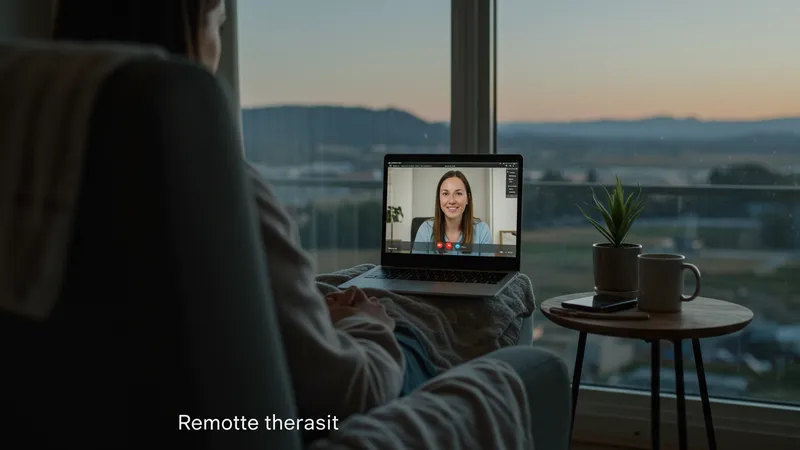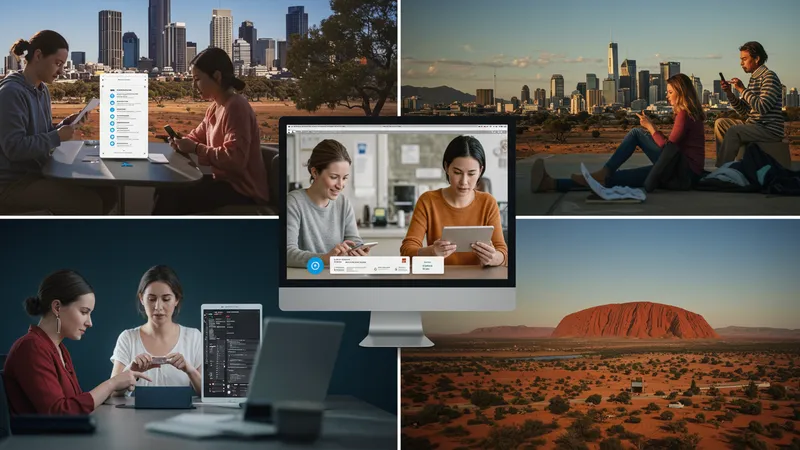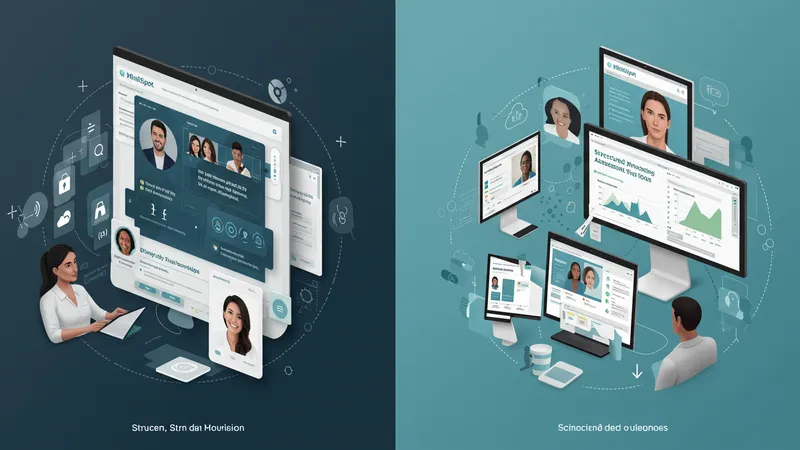

Virtual mental health counselling is reshaping how Australians access support for wellbeing and emotional challenges. Rather than having to sit in a clinician’s office, this approach connects people with qualified professionals via secure video calls, chat platforms, or phone conversations. The goal is to bridge distances, remove the need to travel, and make expert guidance available on-demand, wherever clients are comfortable. Technology now allows anyone to seek professional mental health support, regardless of their location within Australia’s vast geography.
This digital model keeps everything as confidential as traditional sessions, while enabling more flexible scheduling and real-time assistance. Whether someone is in a metro area or the most remote parts of Western Australia, professional guidance is now feasible without long waits or travel logistics. Sessions may involve cognitive behavioural therapy, counselling for anxiety or depression, or tailored strategies to navigate life’s challenges—a qualified clinician simply joins you online, creating a safe space without physical barriers.

The flexibility of online mental health counselling aligns well with the demands of rural Australia, where specialist services can be out of reach for hundreds of kilometres. The convenience of scheduling also benefits those with work, study, or caregiving commitments. As demand for support grows, digital services ensure no one in Australia has to go without experienced, professional help, even in unexpected times of crisis or isolation.
Counselling through online platforms can adapt to individual needs: some clients prefer regular video calls, while others appreciate the anonymity of chat or phone-based interactions. These options provide multiple ways to access evidence-based therapy and connect with counsellors who understand Australia's unique cultural and social contexts. Many platforms also accommodate those wanting Indigenous mental health expertise or support in specific languages.
The quality of care in online therapy is monitored under the same rigorous standards as in-person services. In Australia, qualified counsellors and psychologists must be accredited by bodies like the Australian Health Practitioner Regulation Agency (AHPRA), safeguarding client wellbeing. Resource-rich digital clinics often offer additional modules such as psychoeducation, guided self-help, or peer support forums, further enriching the support available from anywhere.
Privacy is a cornerstone of each service. Australian laws such as the Privacy Act 1988 require platforms to employ strict data protection measures. Confidentiality, informed consent, and responsible data usage are built into every interaction. As digital health continues to evolve, these protections reinforce client confidence in online mental health support.
The deeper details reveal even more valuable insights ahead: from how these platforms foster client-therapist trust to the unique benefits for Australian communities, and the innovative features that set leading services apart—each facet offers a compelling look into the future of accessible, professional guidance for mental wellbeing in Australia.
Online mental health counselling in Australia leverages robust internet connectivity to remove longstanding barriers to care. By enabling access from smartphones, tablets, and computers, these services ensure assistance is available in both bustling cities and remote Outback communities. The digital infrastructure supporting platforms like BetterHelp Australia and MindSpot means that almost anyone, regardless of postcode, can connect with a qualified mental health professional within days, and sometimes hours.

One significant advantage is platform flexibility. Most leading online therapy options in Australia let users schedule sessions in early mornings, evenings, or weekends—a notable shift from limited in-office hours. Additionally, asynchronous options, such as secure messaging with therapists, empower clients to reflect and communicate at their own pace. This is especially valuable for those hesitant to speak about their experiences in real-time or who have unpredictable routines.
Government investment in telehealth infrastructure has further improved reliability and affordability. During the COVID-19 pandemic, Australia rapidly expanded digital healthcare subsidies—including mental health support—to keep citizens connected to timely assistance. These changes accelerated adoption and reduced the stigma around accessing help through a screen, demonstrating that professional care transcends physical boundaries with the right technology in place.
Accessibility is also enhanced for culturally diverse and Indigenous Australians through targeted programs. Many online counselling platforms offer practitioners with training in cross-cultural competencies, as well as interpreters if required. This approach tailors support to Australia’s rich tapestry of backgrounds, ensuring professional guidance is both respectful and effective for all who seek it. The streamlined, barrier-free access to care marks a pivotal advancement for mental health support nationwide.
Every online mental health counselling provider operating in Australia must meet stringent quality controls and practitioner standards. Services like those listed previously ensure their counsellors uphold the requirements set by the Australian Health Practitioner Regulation Agency (AHPRA) or relevant professional bodies. This regulation demands that practitioners undergo ethical training, regular professional development, and participate in clinical supervision, mirroring in-person standards.

Choosing a platform means looking for transparent licensing information. For example, the Australian Psychological Society’s “Find a Psychologist” directory exclusively lists clinicians registered with AHPRA, providing users confidence that their therapist has the credentials and understands relevant Australian legal and ethical frameworks. MindSpot, being government-supported, only employs qualified staff who are trained in evidence-based methods and Australian privacy laws.
Another key aspect of quality assurance is the use of secure, encrypted communication channels. BetterHelp Australia and similar digital services invest in robust cybersecurity measures to protect sensitive client data—this aligns with the Privacy Act 1988 and other national regulations. The professionalism and technical safeguards provided ensure individuals can trust their sessions are both confidential and secure.
Lastly, client feedback and ongoing quality evaluation are integral to these services. Many online counselling platforms invite regular reviews and satisfaction surveys, allowing them to refine services and respond to Australians’ evolving needs. These quality loops maintain the highest standards of care and foster continuous improvement across both rural and urban contexts.
The flexibility of online mental health counselling offers significant advantages for Australia’s widely dispersed and culturally varied population. Residents in rural or regional areas can now connect with accredited professionals without long waits or the disruption of travel to distant urban centres. This increased availability bridges crucial care gaps, particularly for communities previously underserved due to geography or workforce shortages.
Younger Australians, who are often digital natives, also appreciate the comfort and familiarity of app-based therapy and secure chat options. Services like BetterHelp Australia specifically design their platforms with intuitive navigation and confidentiality in mind, appealing to tech-savvy individuals who may prefer online interaction over traditional clinic visits. For busy students or workers, the ability to quickly access a qualified counsellor from a smartphone is a practical breakthrough.
Multicultural and Indigenous Australians benefit from culturally competent support. Many online clinics, including MindSpot, offer access to practitioners who understand distinct social contexts and can address language or cultural sensitivities within the therapeutic process. This capability enhances trust and allows more Australians to seek help that resonates with their unique experiences.
Accessibility also extends to individuals with disabilities or mobility limitations who find travel challenging. Online sessions, tailored to accommodate additional accessibility needs (like captioning or text communication), make effective mental health support readily available. Collectively, online counselling’s inclusivity underlines a new era for mental health care in Australia—where support adapts to every individual’s circumstances.
The top online counselling platforms serving Australia differentiate themselves through user-friendly features and responsive support. BetterHelp Australia, for example, offers matching algorithms to pair clients with the most suitable therapist based on preferences and presenting issues. Users can switch counsellors without penalty if the fit isn’t right, which fosters a sense of agency and comfort throughout the therapeutic journey.

MindSpot provides structured online assessment tools, immediate self-help resources, and professionally guided courses addressing topics such as anxiety, depression, and stress management. Clients benefit from an initial evaluation and tailored modules, with regular progress check-ins from qualified personnel. These tools encourage active participation and self-reflection alongside professional input.
The Australian Psychological Society’s directory streamlines the process of selecting a practitioner by allowing users to filter by area of expertise, approach, and language. This flexibility means individuals can locate counsellors skilled in supporting PTSD, relationships, or workplace challenges, ensuring each person receives sensitive, relevant care. Transparent profiles and upfront billing information help clients make informed choices from the outset.
User experience is also shaped by high standards of digital privacy and customer support. Most services have robust help centres, secure logins, and clear privacy policies. Responsive crisis support and a transparent complaints process further reassure clients, making the experience positive from first enquiry to follow-up sessions. As these platforms evolve, Australians can expect ever more personalised, secure, and convenient counselling from anywhere they are.